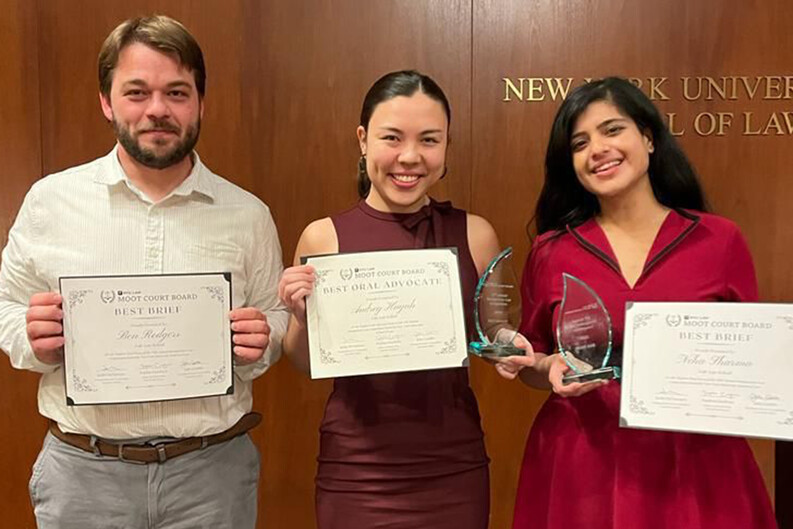Yale Law Team Wins First Place in Immigration Moot Court Competition

A Yale Law School team took the top prize in New York University’s National Immigration Law Competition this winter, surpassing 25 other teams from law schools across the country in the annual moot court contest.
Team members — Audrey Huynh ’25, Neha Sharma ’24, and Ben Rodgers ’24 — agreed on what prepared them to win in simulated court proceedings: writing briefs and otherwise working on immigration cases in the real world through a Yale clinic. All three were students of the Worker & Immigrant Rights Advocacy Clinic4, or WIRAC.
“Although this was my first moot court, it was not my first immigration law appellate brief, nor my first time preparing for oral argument,” Rodgers said. “Clinic helps us build those skills, and it gives us opportunities to confront legal questions and arguments we have never seen before, think creatively, and distill our arguments to present a compelling theory of the case.”
The team also took home the award for best brief. In addition, Huynh — also in her first moot court — won an individual award for the best oral advocate. She has prepared for actual oral arguments in district and appellate court with her clinical teams in WIRAC.
Sharma said having real-life insight into immigration procedure and litigation gave the team an edge over its competitors, all of whom were “extremely well prepared.”
“But our team was able to respond with creative and pragmatic arguments that reflected a real knowledge of how things work in practice,” said Sharma, who also credits a judicial internship with building her legal writing skills. “This would not have been possible without the kind of exposure we gain from doing this kind of work every day in WIRAC.”
Huynh praised the faculty and lecturers of WIRAC, “who always push us to construct rigorous legal arguments, think outside the box, communicate our ideas precisely and effectively, and be able to think on our feet and problem-solve quickly.”
In the week leading up to the competition, students mooted with their clinic instructors and other Yale Law School faculty mentors, including Professors Michael Wishnie ’93, Cristina Rodríguez ’00, Lucas Guttentag, and Visiting Clinical Lecturer Michael Tan ’08. It was thorough preparation for the competition judges, who included immigration lawyers in the early rounds and federal appellate and district court judges for the finals.
“The student team joked that after being mooted by our YLS mentors, the judge panels at the actual competition would feel much easier in comparison — and that was mostly true!” Huynh wrote in an email.
The student team joked that after being mooted by our YLS mentors, the judge panels at the actual competition would feel much easier in comparison — and that was mostly true!”
— Audrey Huynh ’25
Preparation for the competition started before January, when teams had to write and a submit a brief. For the Yale team, that meant collaborating over winter break on Zoom across three continents and time zones. The in-person competition at NYU started on Feb. 2 with a day of preliminary rounds. Teams argued as petitioners or respondents before panels of immigration lawyers who rated their performance. Based on the points they earned during these rounds, teams advanced to day two.
The second day of the competition is a single elimination tournament, with winning teams progressing from the octofinals to the quarterfinal rounds. By the end of the second day, Yale Law School’s team won its semifinal round, securing a place in the finals the next day. The morning started with brunch with two of the judges, who included Judge Eunice Lee ’96 of Second Circuit, Judge Roopali Desai of the Ninth Circuit, and Judge Gregory Woods ’95 of the Southern District of New York. The team then faced the University of Virginia at NYU’s Furman Hall as competition participants and the NYU Moot Court Board watched.
The competition case presented two issues. The first was whether a lower court had correctly taken away the petitioner’s right to have the case be heard in court. The second was about whether a specific immigration statute requires additional notice and opportunity for asylum applicants who had provided credible testimony to immigration judges to submit corroborating evidence. The team wrote its brief for the respondent but also had to argue on the petitioner's side.
All three students recommended moot court as a way to sharpen legal skills and bond with schoolmates.
“Relative to clinical experiences, it is also a comparatively low-stakes way to practice building creative legal arguments and to test out new ideas and strategies for fun,” Huynh said.
This summer, Huynh will intern with the ACLU Immigrants’ Rights Project. Sharma, who graduates this year, will clerk at the U.S. District Court for the Eastern District of New York. Rodgers, who is also graduating, will start a Skadden Fellowship in Springfield, Massachusetts, at the Central West Justice Center. There, he will represent migrant child farmworkers with immigration and workplace legal needs.


